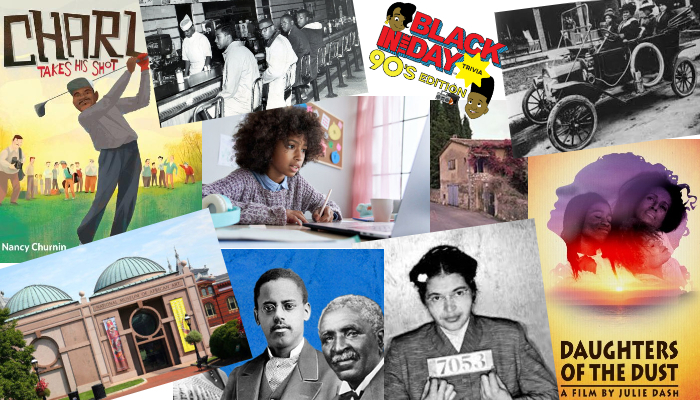By TMoM Team Member Dennette Bailey
Throughout history Black Americans have had their achievements ignored, but February, Black History Month, is designated as the month to ensure there will be some acknowledgment. It is an excellent opportunity to learn about the contributions African Americans have made to America. It was started by Carter G. Woodson in 1915. In solidarity, other countries around the world also celebrate Black History month by acknowledging the achievements of people of African descent.
Listed below are activities that families and individuals can do to help them understand the contributions of African Americans. These are activities that can also help bring your family closer together as well as encourage dialogue for people of diverse backgrounds to value and accept one another.
Movies– There are various movies individuals can watch but I suggest watching movies that are historical in nature as opposed to cultural. Sometimes people of varied backgrounds like to learn the culture first, but many times movies that express culture are mere entertainment and lead to wrong thinking about African Americans. Focus first on historical movies so that when you watch cultural movies later you might be able to recognize the difference between entertainment and truth. Movies such as Hidden Figures, Daughters of the Dust, and Selma are great for adults. Journey in the Box and Ruby Bridges are great movies for children. You can visit this archived blog for more ideas.
Books– There are a plethora of books on Black history but let us focus on books for children here. Charlie Takes His shot by Nancy Churnin and Bring Me Some Apples and I’ll Make You a Pie by Robin Gourley are great books for children. For adults who are new to exploring Black history, I suggest you start with reading books like these to your children as they usually do a good job explaining to a reader of any age the importance of the topic. Children’s books may also help in approaching this new experience with less hesitation.
Museums– There are many museums which offer virtual explorations as a result of the pandemic. This an excellent opportunity to see into various museums at a wider scale than we ever could have before the pandemic. You can see various exhibits at the Smithsonian National Museum of African History, Jack Hadley Black History Museum, the Museum of African American Art in Los Angeles, and the Dance Theatre of Harlem. There are way too many to mention here but you can google online virtual African American Museum and find many offering the virtual experience for free or free for the month of February. In addition, you can visit the International Civil Rights Center & Museum right here in Greensboro.
Poetry– Create poems about Black history or a favorite African American person in history. Creating poems is an activity for any age child. Preschoolers are learning to rhyme words so this is just as important of an activity for your preschooler as it may be for your preteen or teenager. Do remember to respect your child’s expression of poetry.
Online Exhibits– There are many artists’ featuring online exhibits to display African American experiences. Some include exhibits such as Rosa Parks in Her own Words, Chez Baldwin a Novelist Playwright and Poet and Jordan Casteel’s Portraits of Daily Life in a Black Community. These are easily found by an internet search.
Play Games-There are a variety of games that celebrate Black History. I suggest creating your own Jeopardy game with Black History trivia questions or the game Black in the Day 90’s Trivia (blackinthedaygame.com) for entertainment/history.
Inventors– Teaching children about inventors promotes their own creativity and self-esteem. Teaching them about African American Inventors can help your child see how African Americans are relatable to them no matter what race they are. I suggest the inventors of the traffic light, mailbox, the super soaker, 3D special effects, first Clock and peanut products. These are all inventions that children of any age can appreciate, and adults will enjoy learning about these inventors too.
Finally, I hope you will view learning African American History as an opportunity to learn more about yourself. When we purposely seek out information about people and things that are different from us and foreign to us, we can also learn how big the world is in relation to us. Then we learn the excitement this big world offers us. We learn that diverse experiences equate to a bigger and fuller life. And we learn how to experience hope.
Want to see more blogs like this and get notifications on local events and happenings? Subscribe to TMoM’s free weekly newsletters here.
















